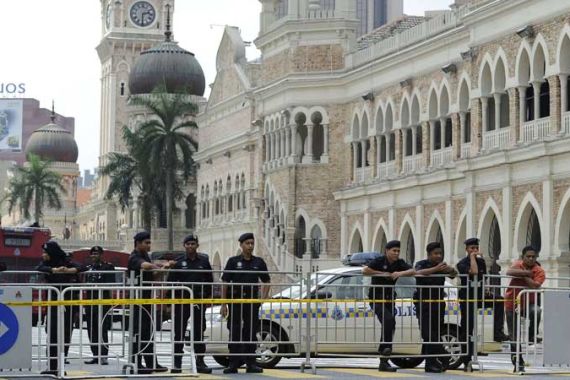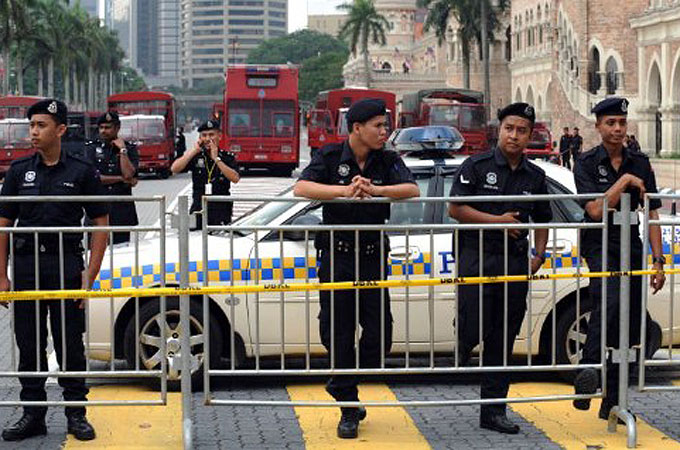Malaysian police lock down capital
Move comes in response to opposition-backed group’s plan to hold a rally to press for greater electoral transparency.

 |
| The government has justified its security measures on the grounds that the protesters threaten national security [AFP] |
Malaysian riot police have sealed off access to the capital, Kuala Lumpur, in preparation for a mass pro-democracy rally called by the opposition and an electoral-reform group seeking greater transparency.
Police set up roadblocks on Saturday in the city centre and lorries mounted with water cannons were deployed to prevent the demonstration.
Major roads in Kuala Lumpur, a city of 1.6 million, were closed. Electronic signboards on highways leading into the city centre warned of legal action against those joining the protest.
The rally’s opposition-backed organisers, Bersih, or Clean, have called for reforms following accusations that the Malaysian election commission is biased towards the ruling coalition, which has been in power since independence from Britain in 1957. The commission denies the charge.
Speaking to Al Jazeera over phone from Kuala Lumpur on Saturday, Edmund Bon, a human-rights lawyer, said: “It’s an extraordinary clampdown on the whole [city] and we are not allowed to go anywhere.
“People are getting arrested on the streets and about 250 to 300 people have been arrested so far in connection with the rally.
“It’s the government that is causing the situation to exacerbate.
“It was a peaceful static rally and there was not even plan to walk to another place, but now it has become so big that we anticipate running battles, use of tear gas and water cannons to disperse the crowds.”
Painful reforms
If the pro-democracy rally materialised despite the government’s crackdown, it could signal that the ruling National Front coalition is losing ground and may spur Najib Razak, the Malaysian prime minister, to delay painful economic and political reforms.
A general election is not due until 2013 but Razak has not ruled out early polls, after economic growth accelerated to a 10-year high in 2010.
Despite government accusations that the protesters were threatening national security, Bersih had been adamant that it was pushing for electoral reform.
“No matter how badly we are repressed or prosecuted, the peaceful voice of the rakyat (people) will be heard in Kuala Lumpur come the 9th of July,” it said in a statement.
Major street demonstrations are rare in this Southeast Asian country, but the rise of alternative media channels and a growing opposition voice are gradually creating a more vocal Malaysian public.
Tens of thousands of demonstrators demanded reforms at a November 2007 rally, which analysts said galvanised support for the opposition ahead of record gains in a 2008 general election.
The police launched a similar crackdown in 2007.
Razak took power in 2009, and inherited a divided ruling coalition which had been weakened by historic losses in the 2008 polls.
He had promised to restructure the government and economy and introduce an inclusive brand of politics aimed at uniting the country’s different ethnic and religious groups.
Razak’s approval ratings have risen from 45 per cent to 69 per cent in February, according to Merdeka centre, an independent polling group. But analysts said recent ethnic and religious differences have undermined his popularity.